-
06-14-2024
Duração e qualidade do sono da equipe de enfermagem brasileira que trabalha em turnos
Revista Brasileira de Enfermagem. 2024;77(2):e20230167
Abstract
Duração e qualidade do sono da equipe de enfermagem brasileira que trabalha em turnos
Revista Brasileira de Enfermagem. 2024;77(2):e20230167
DOI 10.1590/0034-7167-2023-0167
Views0See moreRESUMEN
Objetivo:
analizar la duración y calidad del sueño en profesionales de enfermería que trabajan por turnos.
Método:
investigación analítica, transversal, realizada entre septiembre de 2017 y abril de 2018, en un hospital público del sur de Brasil, con el equipo de enfermería. Se utilizó el cuestionario sociolaboral y de síntomas de salud, la Escala de Somnolencia de Epworth y el Índice de Calidad del Sueño de Pittsburgh. Los datos se presentan como estadística descriptiva e inferencial, análisis bivariado y regresión logística binaria.
Resultados:
participaron 308 profesionales de enfermería, con predominio de sueño prolongado, ausencia de somnolencia y mala calidad del sueño. La duración corta del sueño (<6 h) se asoció con turnos de día y mala calidad del sueño. La calidad del sueño se asoció con la presencia de somnolencia diurna excesiva y con el trabajo diurno.
Conclusión:
los turnos de trabajo, el insomnio y la cefalea fueron los principales factores relacionados con la falta de sueño de los profesionales de enfermería. Los resultados pueden justificar el desarrollo de investigaciones de intervención para la salud de los trabajadores.
-
ORIGINAL ARTICLE06-14-2024
Sleep duration and quality of Brazilian nursing staff who work in shifts
Revista Brasileira de Enfermagem. 2024;77(2):e20230167
Abstract
ORIGINAL ARTICLESleep duration and quality of Brazilian nursing staff who work in shifts
Revista Brasileira de Enfermagem. 2024;77(2):e20230167
DOI 10.1590/0034-7167-2023-0167
Views0See moreABSTRACT
Objective:
to analyze sleep duration and sleep quality in nursing professionals who work in shifts.
Method:
this is a cross-sectional, analytical research, carried out between September 2017 and April 2018, at a public hospital in southern Brazil, with the nursing team. A socio-occupational and health symptoms questionnaire, the Epworth Sleepiness Scale, and the Pittsburgh Sleep Quality Index were used. Data are presented as descriptive and inferential statistics, bivariate analysis, and binary logistic regression.
Results:
participants were 308 nursing professionals with a predominance of long-term sleep, absence of drowsiness, and poor sleep quality. Short-term sleep (<6h) was associated with day shift and poor sleep quality. Sleep quality was associated with presence excessive daytime sleepiness and work day shift.
Conclusion:
work shift, insomnia and headache were the main factors related short-term sleep for nursing professionals. The results may justify the development of intervention research for workers’ health.
-
ORIGINAL ARTICLE06-14-2024
Translation and Cross-Cultural Adaptation of the LYMPH-ICF Instrument for Lymphedema into Portuguese/Brazil
Revista Brasileira de Enfermagem. 2024;77(2):e20230137
Abstract
ORIGINAL ARTICLETranslation and Cross-Cultural Adaptation of the LYMPH-ICF Instrument for Lymphedema into Portuguese/Brazil
Revista Brasileira de Enfermagem. 2024;77(2):e20230137
DOI 10.1590/0034-7167-2023-0137
Views0See moreABSTRACT
Objective:
The aim of this study is to cross-culturally adapt the Lymphoedema Functioning, Disability and Health Questionnaire Lymphoedema (LYMPH-ICF) instrument into Brazilian Portuguese and conduct a pilot application (n = 10), without psychometric pretensions.
Method:
Methodological research was conducted, following the steps of translation, synthesis, back-translation, and evaluation by the expert committee. Two translators, two back-translators, and twelve professionals participated in the expert committee. A pretest was carried out with 10 patients with secondary lymphedema due to breast cancer. The degree of agreement was determined by the content validity coefficient.
Results:
It was necessary to modify 8 out of the 29 questions comprising the questionnaire, which exhibited idiomatic disagreement. However, despite these changes, there were no indications of impairments, as content reliability was achieved through a validity coefficient of 0.90.
Final Considerations:
The instrument was successfully translated and cross-culturally adapted for Brazil with a high level of agreement.
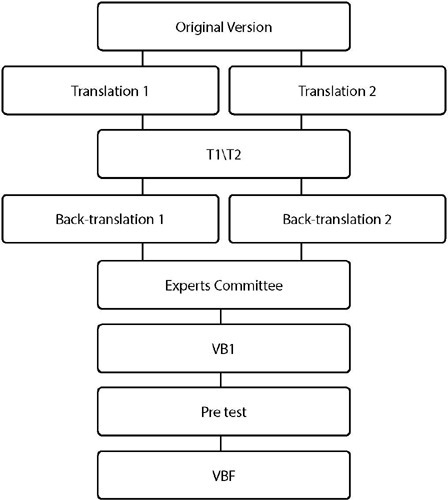
-
ORIGINAL ARTICLE05-27-2024
Fall Tailoring Interventions for Patient Safety Brazil Program: an evaluability study in a teaching hospital
Revista Brasileira de Enfermagem. 2024;77(2):e20230348
Abstract
ORIGINAL ARTICLEFall Tailoring Interventions for Patient Safety Brazil Program: an evaluability study in a teaching hospital
Revista Brasileira de Enfermagem. 2024;77(2):e20230348
DOI 10.1590/0034-7167-2023-0348
Views0See moreABSTRACT
Objectives:
to present the theoretical model, logic model, and the analysis and judgment matrix of the Fall TIPS Brazil Program.
Methods:
a qualitative, participatory research approach, in the form of an evaluability study, encompassing the phases (1) problem analysis; (2) program design, development, and adaptation to the Brazilian context; (3) program dissemination. Data were collected through document analysis and workshops.
Results:
through document analysis, workshops with stakeholders from the participating institution, and validation with key informants, it was possible to identify the program’s objectives, expected outcomes, and the target audience. This allowed the construction of theoretical and logic models and, through evaluative questions, the identification of indicators for the evaluation of the Fall TIPS Brazil Program.
Final Considerations:
this study has provided insights into the Fall TIPS program, the topic of hospital fall prevention, and the proposed models and indicators can be employed in the implementation and future evaluative processes of the program.
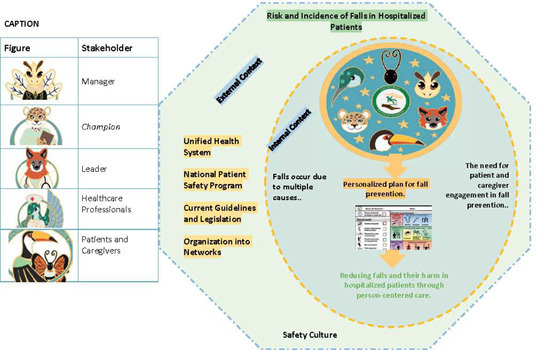
-
ORIGINAL ARTICLE05-27-2024
Nursing care protocol for critical users with tracheostomy under mechanical ventilation
Revista Brasileira de Enfermagem. 2024;77(2):e20230337
Abstract
ORIGINAL ARTICLENursing care protocol for critical users with tracheostomy under mechanical ventilation
Revista Brasileira de Enfermagem. 2024;77(2):e20230337
DOI 10.1590/0034-7167-2023-0337
Views0See moreABSTRACT
Objectives:
to develop and assess a nursing care protocol for critically ill users with tracheostomy under mechanical ventilation.
Methods:
a methodological study, developed through two phases, guided by the 5W2H management tool: I) target audience characterization and II) technology development.
Results:
thirty-four nursing professionals participated in this study, who presented educational demands in relation to care for critical users with tracheostomy, with an emphasis on standardizing care through a protocol and carrying out continuing education.
Final Considerations:
the creation and validity of new technologies aimed at this purpose enhanced the participation of nursing professionals and their empowerment in the health institution’s microsectoral actions and in macrosectoral actions, highlighting the need for public policies that guarantee the conduct of a line of care for users with tracheostomy.
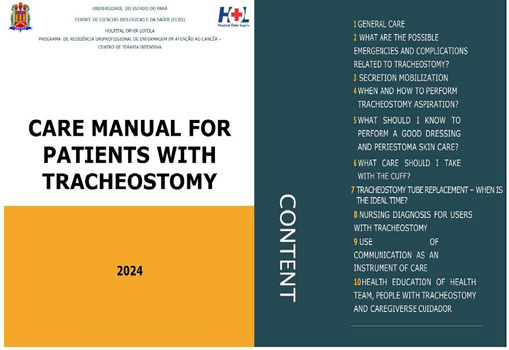
-
ORIGINAL ARTICLE05-27-2024
Assessment of educational technology in lactation physiology by health students
Revista Brasileira de Enfermagem. 2024;77(2):e20230252
Abstract
ORIGINAL ARTICLEAssessment of educational technology in lactation physiology by health students
Revista Brasileira de Enfermagem. 2024;77(2):e20230252
DOI 10.1590/0034-7167-2023-0252
Views0See moreABSTRACT
Objectives:
to assess the suitability, facilitators, and barriers of using a video clip for teaching lactation physiology to health students.
Methods:
a cross-sectional study was conducted with online data collection at a higher education institution, using the Assistive Technology Assessment Instrument and open-ended questions. The sample consisted of 88 students.
Results:
the video clip was deemed suitable in all attributes. Facilitators identified included attractiveness, musicality, and ease of access. Barriers noted were the music’s speed and the necessity for prior knowledge. The video clip achieved adequate scores for interactivity (1.71), purpose (1.77), relevance (1.64), and clarity (1.77). The overall average of the attributes was 1.72.
Conclusions:
the video clip can serve as an effective learning strategy to enhance hybrid education, potentially contributing to the promotion and support of breastfeeding. However, some barriers underscore the importance of prior knowledge for a complete understanding of the content.
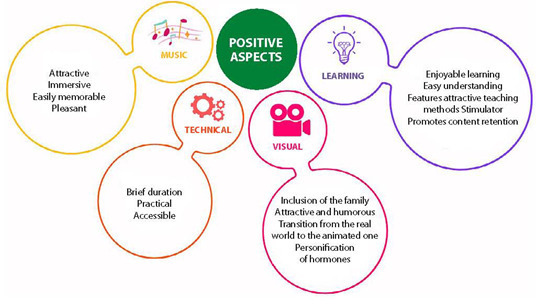
-
ORIGINAL ARTICLE05-27-2024
Technology for nursing care in a Maternal Intensive Care Unit: a methodological study
Revista Brasileira de Enfermagem. 2024;77(2):e20230202
Abstract
ORIGINAL ARTICLETechnology for nursing care in a Maternal Intensive Care Unit: a methodological study
Revista Brasileira de Enfermagem. 2024;77(2):e20230202
DOI 10.1590/0034-7167-2023-0202
Views0See moreABSTRACT
Objectives:
to develop and validate a nursing care plan in a Maternal Intensive Care Unit.
Methods:
a methodological study, developed in stages: integrative review; Nursing History construction; care plan restructuring; appearance and content validity by judges.
Results:
the history was organized into sections: Identification; Basic Human Needs; Physical Examination; and Assessment of Basic Human Needs. A care plan was restructured with 34 diagnoses, organized according to basic human needs. A satisfactory level of appearance validity of the history and care plan was obtained (Concordance Index varying between 86.3 and 100 for both instruments), and content validity with average indexes of 90.8 and 92.8, respectively. Thirty-four diagnoses, their interventions and nursing actions were consolidated.
Conclusions:
the instruments were considered relevant and pertinent in terms of appearance and content, and their use in the institution under study as well as in other similar services may be recommended.
-
05-13-2024
Metodologia qualitativa: considerações e singularidades sobre a implementação de intervenções centradas na pessoa
Revista Brasileira de Enfermagem. 2024;77(3):e770301
Abstract
Metodologia qualitativa: considerações e singularidades sobre a implementação de intervenções centradas na pessoa
Revista Brasileira de Enfermagem. 2024;77(3):e770301
DOI 10.1590/0034-7167.2024770301pt
Views0A investigação qualitativa em saúde permite a compreensão aprofundada de como a pessoa experiencia as diferentes transições de saúde, a relação com os profissionais de saúde e a passagem pelos diferentes ambientes de prática clínica. Concomitantemente, tem o potencial de suportar a tomada de decisão clínica dos profissionais e de empoderar o cidadão na sua […]See more
-
01-01-2016
Association between self-care and hospital readmissions of patients with heart failure
Revista Brasileira de Enfermagem. 2016;69(3):500-506
Abstract
Association between self-care and hospital readmissions of patients with heart failure
Revista Brasileira de Enfermagem. 2016;69(3):500-506
DOI 10.1590/0034-7167.2016690312i
Views0See moreABSTRACT
Objective:
to assess the association between self-care and the number of hospital readmissions of patients with heart failure (ADHF) and test the applicability of two self-care assessment tools. longitudinal study, performed in a cardiology reference hospital in southern Brazil.
Method:
it included 82 patients with a mean age of 61.85±12.33 years, 57.3% male. The mean score of self-care assessment found the scales European Heart Failure Self-care Behavior Scale and Self-care Scale for Patients with Heart Failure was unsatisfactory.
Results:
it was observed an average of 2.57±1.66 rehospitalization last year for decompensated heart failure. There was a correlation between self-care scores with the number of hospital readmissions for decompensated HF. Education and age were associated to self-care of HF patients.
Conclusion:
both scales assess self-care in a relevant way, and correlated their indexes.
-
01-01-2016
Knowledge management in Portuguese healthcare institutions
Revista Brasileira de Enfermagem. 2016;69(3):492-499
Abstract
Knowledge management in Portuguese healthcare institutions
Revista Brasileira de Enfermagem. 2016;69(3):492-499
DOI 10.1590/0034-7167.2016690311i
Views0See moreABSTRACT
Objective:
to evaluate the perception of healthcare institution collaborators in relation to knowledge management in the institution where they operate and analyze the existence of differences in this perception, based on the institution’s management model.
Method:
a study conducted in a sample consisting of 671 collaborators from 10 Portuguese healthcare institutions with different models of management. In order to assess the knowledge management perception, we used a score designed from and based on items from the scores available in the literature.
Results:
the perception of moderate knowledge management on the healthcare institutions and the statistically significant differences in knowledge management perception were evidenced in each management model.
Conclusion:
management knowledge takes place in healthcare institutions, and the current management model determines the way staff at these institutions manage their knowledge.
-
01-01-2016
Social impairment of patients undergoing hematopoietic stem cell transplant
Revista Brasileira de Enfermagem. 2016;69(3):484-491
Abstract
Social impairment of patients undergoing hematopoietic stem cell transplant
Revista Brasileira de Enfermagem. 2016;69(3):484-491
DOI 10.1590/0034-7167.2016690310i
Views0See moreABSTRACT
Objective:
to evaluate the impairment of social and emotional domains of hospitalized patients undergoing hematopoietic stem cells transplantation.
Method:
an observational, longitudinal study with 25 participants evaluated in the period of pre-transplant, pancytopenia and pre-hospital discharge between September 2013 and September 2014, in a reference hospital for this treatment modality in Brazil. Two international instruments were used, both of which translated and adapted to Portuguese (Brazil): Quality of Life Questionnaire-Core 30 and Functional Assessment Cancer Therapy – Bone Marrow Transplantation.
Results:
patients have shown a statistically significant decrease in the social domain, and stability of the emotional function along the course of treatment.
Conclusion:
hematopoietic stem cell transplantation changes the social function of patients with hematologic cancer during hospitalization stage. Thus, patients should receive guidance addressing the social domain in order that it can be less affected.
-
01-01-2016
Frailty and quality of life in elderly primary health care users
Revista Brasileira de Enfermagem. 2016;69(3):478-483
Abstract
Frailty and quality of life in elderly primary health care users
Revista Brasileira de Enfermagem. 2016;69(3):478-483
DOI 10.1590/0034-7167.2016690309i
Views1See moreABSTRACT
Objective:
to investigate the association between physical frailty and quality of life in elderly users of primary health care in the capital of the state of Paraná.
Method:
a cross-sectional, quantitative study with 203 elders. Data collected included: physical activity questionnaires, weight loss, fatigue/exhaustion, quality of life, performance of gait speed tests, and handgrip strength.
Results:
of the 203 older adults, 115 were pre-frail, 49 were non-frail, and 39 were frail, with a significant association with functional capacity and quality of life in all groups. The dimensions resulting from physical aspects, pain, and vitality were associated with those that were non-frail.
Conclusion:
in this study, frailty syndrome was inversely proportional to the quality of life, and significantly associated with functional capacity of older adults. Physical frailty is a manageable condition which can be targeted through geriatric nursing interventions.
-
01-01-2016
Impact of home visits on the functional capacity of patients with venous ulcers
Revista Brasileira de Enfermagem. 2016;69(3):468-477
Abstract
Impact of home visits on the functional capacity of patients with venous ulcers
Revista Brasileira de Enfermagem. 2016;69(3):468-477
DOI 10.1590/0034-7167.2016690308i
Views0See moreABSTRACT
Objective:
to assess the impact of protocol home visits on the functional capacity of adult and elderly patients with venous ulcers, before and after guidance received at home.
Method:
clinical experimental, randomized, nonblinded and controlled study, developed with 32 patients (case and control groups). Fields of research were the Wound Outpatient Care Unit of the Antônio Pedro University Hospital and households of patients treated in the outpatient unit. Data collection occurred from February to June 2014, by means of an assessment tool of the health care unit, the TINETTI index and a script for directions to be provided to study participants who received home visits.
Results:
participants in the case group showed significant and differentiated improvement post-intervention when compared to the control group, which remained stable.
Conclusion:
directions provided in the home context were beneficial to the members of the case group.
-
01-01-2016
Pressure ulcers in critically ill patients: incidence and associated factors
Revista Brasileira de Enfermagem. 2016;69(3):460-467
Abstract
Pressure ulcers in critically ill patients: incidence and associated factors
Revista Brasileira de Enfermagem. 2016;69(3):460-467
DOI 10.1590/0034-7167.2016690307i
Views0See moreABSTRACT
Objective:
to identify the incidence and describe the associated factors for pressure ulcers in critically ill patients.
Method:
this was a prospective cohort study with 77 patients, using a clinical, metabolic assessment and the associated factors for pressure ulcer, applying the risk scales (Braden and Waterlow) and assigning ulcers to categories.
Results:
an incidence of 22% (95% CI 12.6 – 31.5), with 17 patients with 32 pressure ulcers in the sacral region (47%), and of Class I (72%). The length of stay was greater than ten days (71%), most admissions were surgical (53%) or for congestive heart failure (24%), and were high risk on the Braden Scale (59%).
Conclusion:
the study highlights the high incidence of pressure ulcers, clinical and metabolic characteristics and associated factors, as well as the outcome of death, requiring, therefore, preventive measures.
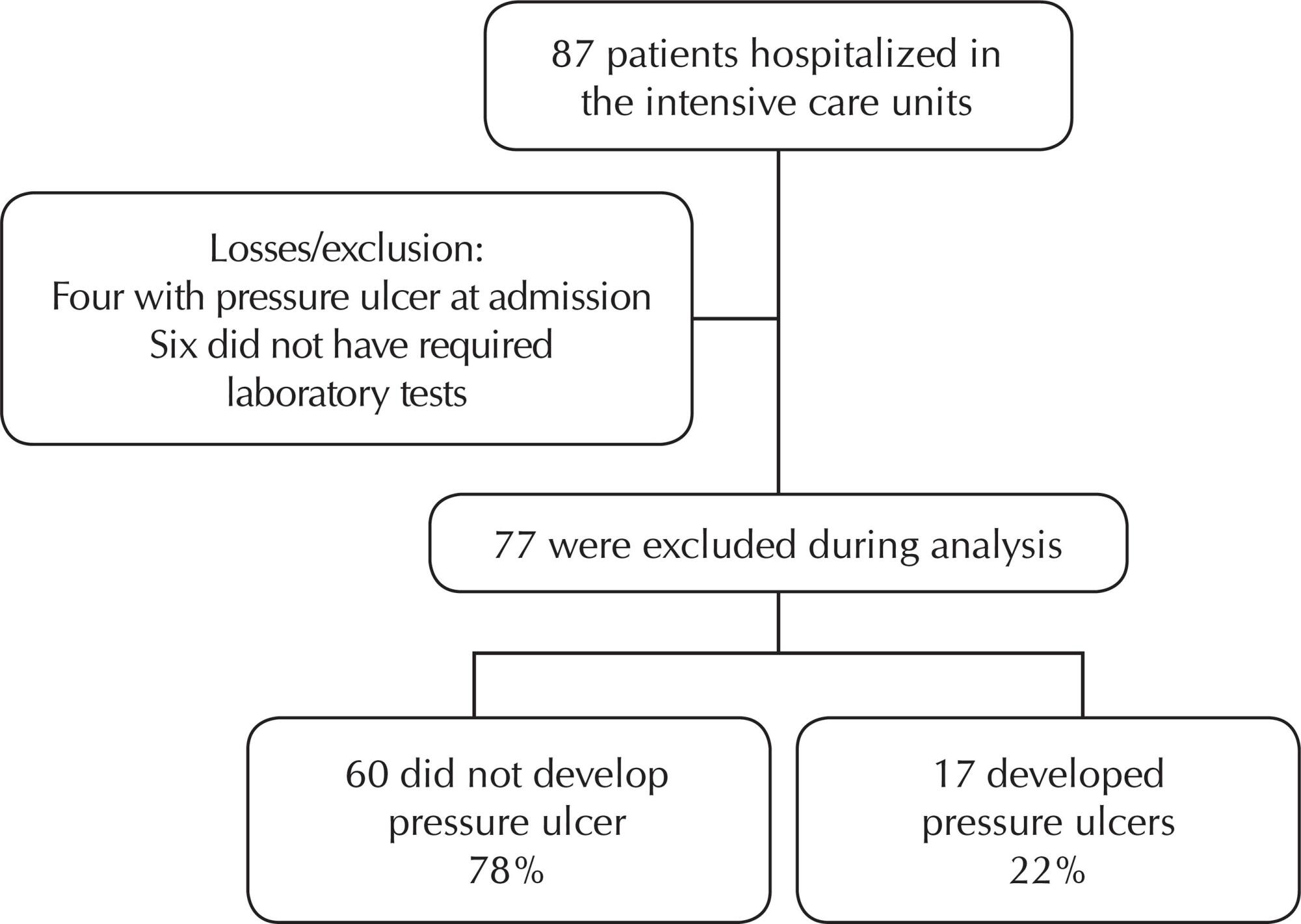
-
01-01-2016
Accreditation in a public hospital: perceptions of a multidisciplinary team
Revista Brasileira de Enfermagem. 2016;69(3):451-459
Abstract
Accreditation in a public hospital: perceptions of a multidisciplinary team
Revista Brasileira de Enfermagem. 2016;69(3):451-459
DOI 10.1590/0034-7167.2016690306i
Views1See moreABSTRACT
Objective:
to analyze the perceptions of the multidisciplinary team on Accreditation in a public hospital.
Method:
descriptive, exploratory, qualitative research, performed in May 2014, using recorded individual interviews. In total, 28 employees of a public hospital, Accredited with Excellence, answered the guiding question: “Tell me about the Accreditation system used in this hospital”. The interviews were transcribed and subjected to content analysis.
Results:
of the speeches, three categories emerged: Advantages offered by the Accreditation; Accredited public hospital resembling a private hospital; Pride/satisfaction for acting in an accredited public hospital.
Conclusion:
participants perceived Accreditation as a favorable system for a quality management in the public service because it promotes the development of professional skills and improves cost management, organizational structure, management of assistance and perception of job pride/satisfaction.
-
01-01-2016
Health status and the return to work after traffic accidents
Revista Brasileira de Enfermagem. 2016;69(3):443-450
Abstract
Health status and the return to work after traffic accidents
Revista Brasileira de Enfermagem. 2016;69(3):443-450
DOI 10.1590/0034-7167.2016690305i
Views0See moreABSTRACT
Objective:
to compare the health status of traffic accident victims, at hospital discharge and after six months, and to analyze the predictive variables of their health status and return to work.
Method:
observational, longitudinal study. Data were collected through interviews and medical records of 102 patients with a mean age of 33 years; with the majority being men and victims of motorcycle accidents. The variables were analyzed by means of validated tools, student’s t-test, multiple linear regression, and logistic regression.
Results:
there was an improvement of perception in the patients’ health status six months after hospital discharge and functional capacity. The individuals who returned to work showed better health-related quality of life evaluation.
Conclusion:
improvement of the perceived health status six months after hospital discharge was found. Factors that influenced the patients’ return to work were not identified.
-
01-01-2016
ERRATUM
Revista Brasileira de Enfermagem. 2016;69(5):1002-1002
Abstract
ERRATUM
Revista Brasileira de Enfermagem. 2016;69(5):1002-1002
DOI 10.1590/0034-7167.20166905e01
Views0Article “Alcohol and alcoholism: attitudes of nursing students”, with number of DOI: http://dx.doi.org/10.1590/S0034-71672013000100013, published in the journal Revista Brasileira de Enfermagem, v66(1):84-9, page 89 that read:“18. Miranda SP, Vargas D. Satisfação de pacientes de um centro de atenção Psicossocial álcool e drogas com o atendimento do enfermeiro. SMAD, Rev Eletrônica Saúde Mental Alcool Drog 2019;5(2):1-15”.[…]See more -
01-01-2016
Research methodology for nursing and health: a book review
Revista Brasileira de Enfermagem. 2016;69(5):1000-1001
Abstract
Research methodology for nursing and health: a book review
Revista Brasileira de Enfermagem. 2016;69(5):1000-1001
DOI 10.1590/0034-7167-2015-0135
Views1For those interested in nursing and health, the book entitled “Research methodology for nursing and health: from theory to practice”() was released in October 2015, at the 67th Brazilian Congress of Nursing, sponsored by National ABEn. The interest emerged from two organizers: Dr. Maria Ribeiro Lacerda (UFPR) and Dr. Regina Gema Santini Costerano (UNIFRA). Forty-seven […]See more -
01-01-2016
Violence in the workplace in Nursing: consequences overview
Revista Brasileira de Enfermagem. 2016;69(5):996-999
Abstract
Violence in the workplace in Nursing: consequences overview
Revista Brasileira de Enfermagem. 2016;69(5):996-999
DOI 10.1590/0034-7167-2015-0133
Views0See moreABSTRACT
Objective:
to reflect on the consequences of workplace violence experienced by nursing professionals.
Methods:
this is a reflection paper based on recent publications related to the subject, particularly researches carried out in Brazil and in other countries.
Results:
exposure to workplace violence has been associated with health problems in nursing professionals, which may be physical damage, emotional manifestations, and psychic disorders. It also affects the employee performance, his or her family and social interactions.
Conclusion:
this phenomenon is potentially noxious and costly, for it leads to suffering, illness, absence from work, and even death. This reflection calls attention moreover to the importance of a safe and adequate health care work environment.
-
REFLECTION01-01-2016
Construcción de la enfermera de práctica avanzada en Catalunya (España)
Revista Brasileira de Enfermagem. 2016;69(5):991-995
Abstract
REFLECTIONConstrucción de la enfermera de práctica avanzada en Catalunya (España)
Revista Brasileira de Enfermagem. 2016;69(5):991-995
DOI 10.1590/0034-7167.2016690507
Views0RESUMEN
El desarrollo de la enfermera de práctica avanzada (EPA) ha supuesto un reto para las enfermeras en países como EE.UU., Canadá, Gran Bretaña y Australia, entre otros, y desde hace escasos años está siendo considerada en Catalunya y España como un sistema para desarrollar nuevos roles que aporten eficacia y eficiencia al sistema sanitario. El presente artículo pretende conceptualizar la EPA y los modelos de referencia así como contextualizar y reflexionar sobre la EPA en Catalunya, desde el punto de vista de formación y de la implantación de los denominados nuevos roles de enfermería, asimilándolos a la práctica avanzada.
Keywords:Competencia ClínicaEnfermeríaEnfermería de Práctica AvanzadaPráctica ProfesionalRol de la EnfermeraSee more -
01-01-2016
Developing the Advanced Practice Nurse in Catalonia
Revista Brasileira de Enfermagem. 2016;69(5):991-995
Abstract
Developing the Advanced Practice Nurse in Catalonia
Revista Brasileira de Enfermagem. 2016;69(5):991-995
DOI 10.1590/0034-7167.2016690507
Views0See moreABSTRACT
The development of advanced practice nurses (APN) has proved a challenge for nurses in countries such as the USA, Canada, Great Britain, and Australia among others. It is only in recent years that the system has been considered in Catalonia and Spain as a way to develop new roles to bring effectiveness and efficiency to the health system. From the standpoint of training and implementation of the above-mentioned new nursing roles, the following article aims to conceptualise APN and its reference models, as well as to contextualise and reflect on APN in Catalonia in order to assimilate them into advanced practice.
-
01-01-2016
International academic mobility in nursing education: an experience report
Revista Brasileira de Enfermagem. 2016;69(5):986-990
Abstract
International academic mobility in nursing education: an experience report
Revista Brasileira de Enfermagem. 2016;69(5):986-990
DOI 10.1590/0034-7167-2015-0128
Views0See moreABSTRACT
Objective:
report the experience of international academic mobility in Ireland through the program Science Without Borders during undergraduate education in nursing.
Method:
a report of experience presented in chronological order, with a descriptive nature.
Results:
the opportunity to know and be able to discuss questions regarding health and nursing in Ireland allowed the review of concepts and a more reflective perspective regarding nursing practices. Additionally, the exchange promoted personal strengthening regarding the confrontation and solution of problems, development of technical and scientific abilities, improvement of linguistic competences and construction of personality, independence and maturity.
Conclusion:
regarding such constructive and enriching experience that this mobility provides to students, to the governing authorities, to the population and to Brazilian nursing, sharing this experience is expected to serve as encouragement for those who search for new horizons, with the objective of adding knowledge for their personal and professional life.
-
01-01-2016
Online training for health professionals in three regions of Brazil
Revista Brasileira de Enfermagem. 2016;69(5):981-985
Abstract
Online training for health professionals in three regions of Brazil
Revista Brasileira de Enfermagem. 2016;69(5):981-985
DOI 10.1590/0034-7167.2016690506
Views0See moreABSTRACT
Objective:
to describe online training experience aimed at professionals working in the public health service in 27 Neonatal and Pediatric Intensive Care Units, and to reflect concerning the training process and possible improvements in this process.
Method:
this is an experience report study about the online training with multidisciplinary content, planned from the situational diagnosis of 27 institutions. The training target set was 10 participants per institution and per module, including the following topics: Indicators of Quality as a Management Tool, Hand Hygiene, Patient Safety, Intravenous Therapy and Patients’ Chart Record.
Results:
a total of 2,071 active students in the modules, with 1,046 approved. The mean of 76 students per module exceeded the target set.
Conclusion:
experience has shown that online training is comprehensive as a potential tool for the professional technical development and digital inclusion. The online learning system becomes weakened if participants are unaware of the technological resources.
-
01-01-2016
Technologies in intensive care: causes of adverse events and implications to nursing
Revista Brasileira de Enfermagem. 2016;69(5):972-980
Abstract
Technologies in intensive care: causes of adverse events and implications to nursing
Revista Brasileira de Enfermagem. 2016;69(5):972-980
DOI 10.1590/0034-7167.2016690505
Views0See moreABSTRACT
Objective:
to identify the causes of adverse events affecting clients resulting from the use of equipment in intensive care services; to point out the main recommendations for clinical practice to minimize these events and, then, discuss the implications to nursing care.
Method:
integrative and descriptive review on the SciELO, Medline, LILACS, and PubMed databases. Articles were selected based on the inclusion criteria and the structured instrument was applied.
Results:
altogether, 11 articles were selected where three evidence units were outstanding: Equipment failure; inadequate use of equipment; and team failure. Permanent education of professionals; evaluation of production and availability of equipment; and use of checklists are recommended.
Conclusion:
preventing adverse events related to equipment is one of the nursing responsibilities and requires the establishment of defensive barriers to prevent these.
Search
Search in:
Nuvem de Tags
Adolescente (85) Atenção Primária à Saúde (239) COVID-19 (91) Criança (91) Cuidados de Enfermagem (269) Educação em Enfermagem (151) Educação em Saúde (139) Enfermagem (930) Enfermagem Pediátrica (86) Estudantes de Enfermagem (77) Estudos de Validação (131) Família (87) Idoso (208) Promoção da Saúde (99) Qualidade de Vida (104) Saúde do Trabalhador (86) Saúde Mental (145) Saúde Pública (82) Segurança do Paciente (150) Tecnologia Educacional (100)



